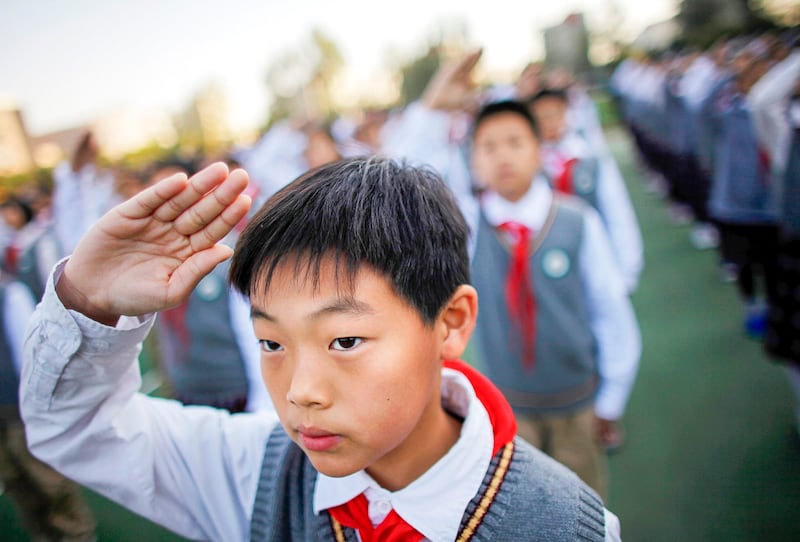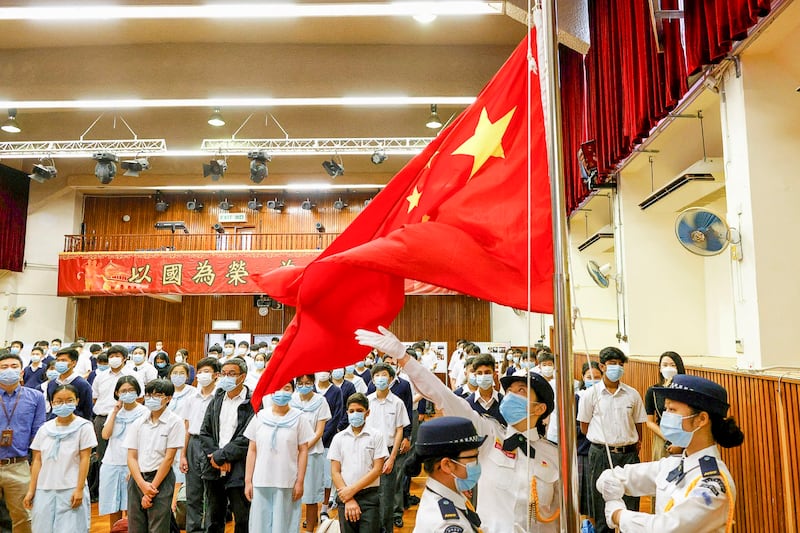China's internet censors have deleted a video in which children at a private performing arts school in the southwestern province of Sichuan dance to British rock band Pink Floyd's 1979 hit "Another Brick in the Wall, Part 2" which featured a choir of schoolchildren protesting overbearing authority and "thought control" in education.
In the video posted by the Let’s Music arts school in Sichuan's Leshan city, a line of children in matching black T-shirts march robotically in front of hundreds of spectators on a busy shopping street, singing "We don't need no education. We don't need no thought control," before breaking into a tightly choreographed dance to the Pink Floyd track.
"No dark sarcasm in the classroom -- hey, teacher! Leave those kids alone," the song goes. "All in all, you're just another brick in the wall."
The clip, posted to X by current affairs tweeter Byron Wan on May 16, is still visible outside the Great Firewall of Chinese internet censorship, but was no longer available on the video-sharing platforms Douyin and Bilibili on Tuesday.
The Douyin link to the clip returned the message "That video does not exist," while the Let's Music channel on Bilibili showed links to other songs performed in the same location, but not "Another Brick in the Wall."
Let’s Music said in a statement on May 7 that the performance was deliberately intended to be a comment on "the current situation," without giving further details.
Patriotic education
The ruling Chinese Communist Party under Xi Jinping is currently stepping up its program of "patriotic education" in schools and universities across the country, in a move that many outside China have criticized as " brainwashing," a term first used in English by U.S. journalist Edward Hunter in 1950 to describe how the Chinese government got people to support China's efforts during the Korean War.
Last October, China passed the Patriotic Education Law with the aim of "enhancing identification with our great motherland, the Chinese nation, Chinese culture and the Communist Party," amid an ongoing nationwide campaign under Xi to boost ruling party involvement in cultural output at every level, in a manner some have likened to Mao Zedong's 1966-1976
[ Cultural RevolutionOpens in new window ]

Pink Floyd’s original song sold more than four million copies worldwide and topped singles charts, making Rolling Stone magazine's list of the 500 Greatest Songs of All Time. It was penned by Pink Floyd's bass player Roger Waters as a protest over rigid and abusive schooling, particularly in British boarding schools.
According to Wan, the video disappeared from Douyin and Bilibili more than a week after being posted there.
"Censors in China have been keeping an eye on X," he commented after followers reported that the clip was no longer available.
Artistic resistance
France-based film director Hu Xueyang said he was happy to see some form of artistic resistance still alive in China.
"When politics is uptight, then there's a lot of political satire," Hu said. "In dark times, all we have left is artistic ridicule and black humor."
"China's younger generation is making its voice heard, and using various forms of resistance," he said.
Paris-based artist Jiang Bu agreed, saying the song epitomized saying "no" to totalitarian control.
"There was a kind of resistance or opposition to totalitarianism in a lot of the music from that time, including Pink Floyd's stuff," Jiang said. "It was about saying no."
"Let’s Music may not have intended direct resistance, but it still chose this song ... that has resistance at its core, so there was a point to it."

He said the removal of the track had attracted more views to the Let’s Music channel than it would normally have gotten, ironically alerting more people to the song's meaning.
He likened the backlash to the authorities pulling the plug on a live stream by beauty influencer Austin Li on the eve of the anniversary of the Tiananmen massacre because it showed an ice-cream cake in the shape of a tank.
That piece of censorship had ensured that more people found out what happened on the night of June 4, 1989 -- something that has been largely erased from the public record in China -- than might otherwise have done, Jiang said.

When Pink Floyd went to record children from London’s Islington Green School singing the refrain of the song, they hid the lyrics from the headteacher for fear she would pull the plug on the project, according to the band's Wikipedia page, citing media reports.
Late British Prime Minister Margaret Thatcher was said to have "hated" the song, according to the school's former director of music, while the Inner London Education Authority criticized it as "scandalous." The song was banned by the South African government of the time.
Translated by Luisetta Mudie. Edited by Eugene Whong .
